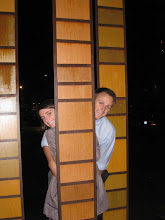I love my new family and village. This is a fantastic site placement and I have been blessed to have so many people supporting my work. My new best friend in the village is my 10-year-old brother. He brings me presents all the time and talks to me nonstop whether or not I understand what he’s saying. His favorite presents to give are seashells stuffed with fake flowers. He presents it to me and then runs it up to my room where they are proudly displayed on my windowsill. My sister is amazing and ever so patient with her four children. I’m thrilled to have this family on my side and the children as allies in the school.
People in the village whom I’ve been introduced to or whom I’ve gone to see (including the post office employees *hint hint*) comment on my language. They compliment how well I speak after such a short period of time. At first I thought they were just being nice, but the other day I overheard the two librarians talking about me and they affirmed what I’ve been told about my speech. This is shocking to me because learning Armenian is no easy task. After studying diligently in classes with Armenian language teachers we’re sent here to learn on our own. This becomes quite a task when the words I may have learned in one region are not spoken by the population at my new site. Armenian Barbar is slang that is used in different areas of the country. Sometimes my family will spend an entire dinner conversation trying to explain a term to me that, had they said the official word in the first place, would have been completely understandable. I’m sure my speech sounds rather bookish to them, but the Peace Corps didn’t give me an Armenian Barbar/English dictionary. As if the Barbar doesn’t present enough of an issue, the majority of the population speaks Russian fluently and often uses Russian terms in daily speech. I learned some Russian words in our classes, but different not nearly as much as I wanted. The family got a big laugh one night when I spent 15 minutes trying to figure out if I liked ice cream. Of course I couldn’t find the word in my dictionary and it wasn’t until my sister realized they were using Russian that I clarified that it is in fact one of my favorite foods.
Life is different now that I don’t have the support system of the other Americans or LCFs around. I tend to get pretty lonely when I want to talk and am unable. This provides a great incentive to learn and study as much as possible. One of my favorite techniques is watching Sabor a Ti (a Spanish soap opera dubbed into Armenian). “Miranda” as it is called by its devoted Armenian audience, is on every afternoon and uses such basic sentence structure that even I can follow a majority of the storylines. The other day, for instance, I was watching and all of a sudden it occurred to me that I new exactly what was being said. I consulted my dictionary to confirm and sure enough the man had said “I have no appetite”. I’m sure my sister finds it entertaining to watch the show with me because usually when I can directly translate a phrase or expression like that I shout it out with enthusiasm. I just get very excited when I think about how when I arrived nothing anyone said made sense…and now I can watch television. Speaking of television, one of the other shows that the kids and I enjoy is called Strange but True. It’s like a newscast similar to Ripley’s Believe it or Not. We sit around the television watching crazy behavior from all over the world; laughing at a man lifting hundreds of pounds with his ears or women sumo wrestling. The kids enjoy movies a lot too. The other night we watched Monsters Inc. in Russian together. This is fun entertainment because they get everything arranged just like we would in America. For instance, we pick corn husks from our garden, pull out all the seeds and pop them in a skillet over the gas tank…ok…so not just like America, but movie and popcorn- it’s kind of the same!
Whenever I’m having a bad day, I have not walked enough. Every morning I get up before the sun makes it over the mountains and I walk for about an hour. I need this exercise, but I also need this time to process everything that’s going on. It is quiet in the mornings (when I get out of town and away from the scary stray dogs) and I look at the majesty of this beautiful country and I give thanks that I am able to work here for a little while. I also think of all of you and I pray that you’re doing well and enjoying autumn in America. Thank you for your continued love and support.
Introducing Emelyn Ruth Bornstein
8 years ago
